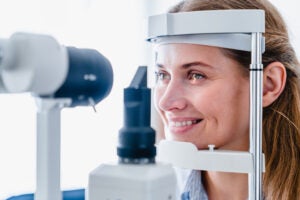Why Are Dilated Eye Exams So Important?

Taking care of your eyes is crucial to maintaining good eye health and preventing vision loss. One important aspect of this is undergoing regular eye exams. During a comprehensive eye exam, your optometrist may recommend a dilated eye exam, which involves using drops to enlarge your pupils to get a better view of the back of your eye. This blog post will explain the importance of dilated eye exams and the conditions and diseases they can help diagnose.
Conditions and Diseases Dilated Eye Exams Can Help Your Optometrist Diagnose
The dilation of the pupil enables a precise analysis of various eye structures such as the blood vessels, tissues, focusing lens, retina, optic nerve, and macula.
Making your eyes dilated helps optometrists to detect the following conditions and diseases:
- Cataracts: a clouding of the lens in your eye that can lead to vision loss if not treated.
- Glaucoma: a condition that damages the optic nerve and can result in vision loss.
- Diabetic retinopathy: damage to the blood vessels in the retina that can occur in people with diabetes.
- Macular degeneration: a condition that affects the center of the retina, leading to a loss of central vision.
- Retinal tumor: a growth on the retina that can interfere with vision.
- Retinal detachment or retinal tears: a separation of the retina from the back of the eye that can cause vision loss.
- Eye floaters: tiny specks or clouds that drift across your vision.
What to Expect with Eye Dilation
The dilation process typically takes 20-30 minutes. The eye drops used to dilate your pupils may sting or burn a little, but the discomfort is usually mild and short-lived. After the drops have taken effect, your optometrist will examine the back of your eye using a special light and lens. You may experience blurry vision and sensitivity to light for a few hours after the exam, so it’s important to bring a pair of sunglasses to wear afterward.
How Often Should You Have a Dilated Eye Exam?
The American Optometric Association recommends that adults have a dilated eye exam every two years until the age of 60, and annually thereafter. However, if you have a family history of eye disease or other risk factors, your optometrist may recommend more frequent exams. Children should have their first eye exam at six months of age, with follow-up exams at three years old and before starting school.
Schedule an Eye Exam in Derry, Londonderry, Raymond, and Windham, NH Today!
Dilated eye exams are an important part of maintaining good eye health, as they can help your optometrist diagnose a range of conditions and diseases that can cause vision loss. If you’re due for an eye exam or have concerns about your vision, contact Spindel Eye Associates today at 603-421-6536 to schedule an appointment. Our experienced optometrists serve patients in Derry, Raymond, Windham, NH, and the surrounding areas, and are committed to providing compassionate, personalized care for all your eye care needs.
RECENT POSTS
categories
- Uncategorized
- Eye Exams
- Lasik
- Spindel Eye Reviews
- Cataracts
- Dry Eyes
- Refractive Errors
- Infographic
- Glaucoma
- Macular Degeneration
- Ocular Diseases
- Pulsed Light Therapy
- IPL
- eye care
- eye health
- Eye irritation
- Eye Syndrome
- Eye Doctors
- Diabetes
- Contacts
- LASIK Surgery
- dry eye syndrome Manchester
- Glasses
- Vision Care
- LipiFlow
- Contact Lenses
- Astigmatism
- Crizal Prevencia
- Spindel Eye
- Children
- skin cancer
